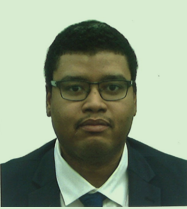Center for Materials Research
Jasmine Beckford, Doctoral Student at the Center for Materials Science, advisor Dr. Messaoud Bahoura, successfully defended her doctoral proposal entitled “Low Power Transparent Heater Based on Degenerate Gallium doped Zinc Oxide Thin Films” and successfully passed her doctoral qualifier exam on August 27, 2021.
 Clifford Denize, Doctoral Student at the Center for Materials Science, advisor Dr. Messaoud Bahoura, was featured as a GEM fellow on the GEM weekly newsletter of August 20, 2021. The GEM Fellowship provides a unique and powerful connection to a national network of universities and employers. This partnership promotes the participation of underrepresented groups in post-graduate science and engineering education and the technical workforce.
Clifford Denize, Doctoral Student at the Center for Materials Science, advisor Dr. Messaoud Bahoura, was featured as a GEM fellow on the GEM weekly newsletter of August 20, 2021. The GEM Fellowship provides a unique and powerful connection to a national network of universities and employers. This partnership promotes the participation of underrepresented groups in post-graduate science and engineering education and the technical workforce.
Department of Computer Science
Felicia Doswell, Ph.D., Associate Professor of Computer Science, Norfolk State University, received an NSF award for a project titled “Collaborative Research: CISE-MSI: RPEP: SaTC: HBCU Artificial Intelligence and Cybersecurity (AI-CyS) Research Partnership". This project involves 7 HBCUs that were awarded $1M to work with 3 National Laboratories to educate and engage students in research efforts in Artificial Intelligence and Cybersecurity. The goal is to develop a collaborative HBCU research incubator and to enhance core CISE research capacity at HBCUs that include workshops, semester research engagement and summer internship opportunities for faculty and students.
D’Nita Andrews Graham, Assistant Professor of Computer Science with Norfolk State University, received notification from the NSF and NSA that the proposal from Norfolk State University had been selected for funding as part of the GenCyber program. The amount of the grant award is $150,000 to fund GenCyber Capacity Building Activities for High School Teachers during the academic year 2021-2022.
Yen-Hung (Frank) Hu, D.Sc., Professor of Computer Science, Norfolk State University, received an equipment award from the NVIDIA Academic Hardware Grant Program. Dr. Hu’s project “Developing Deep Learning Techniques for Classifying Advanced Malwares” was selected from more than 3400 total applications to be a part of the NVIDIA Academic Hardware Grant Program. To support his work and help make his project a success, NVIDIA is donating 2 Quadro RTX8000 & 1 Quadro NVLINK 2 Slot to his team at Norfolk State University.
Mary Ann Hoppa, Ph.D., Associate Professor with Norfolk State University’s Department of Computer Science, was an invited speaker at DEF CON 2021 (https://defcon.org/), the world largest and longest-running underground hacking conference, in the Sea Village (https://hackthesea.org/) on 7 August 2021. Her talk, titled “Hack the Wind[farm]” highlighted cybersecurity risks in offshore wind farms currently being deployed along the U.S. East Coast, and actions needed to avoid infrastructure take-down exploits by malicious nation-states.
Department of Physics
Materials Science and Photonics Center funded for $5M
Dr. Mikhail Noginov (PI) and Dr. Suely Black (Co-PI) received funding for the proposal entitled “Consortium for Research and Education in Materials Science and Photonics Engineering” The Consortium will receive $5M to strengthen the research and education capabilities of Norfolk State University (NSU), Virginia State University (VSU) and Elizabeth City State University (ECSU) in the research areas of Materials Science and Photonics which are the topics of interest to the NSE, Lawrence Livermore National Laboratory (LLNL) and National Ignition Facility (NIF).
Quantum Science Research Center Funded for $5M
The CREST Center for Research and Education in Quantum Leap Science and Technology was funded for five years at $5M for discovery of new quantum materials, development of improved techniques for quantum device manufacturing, and discovery of new emergent quantum phenomena. The NSU research team consists of PI, Doyle Temple, Co-PI’s George Miller III, Hargsoon Yoon, Natalia Noginova, and Sam-Shajing Sun, and Senior Personnel Carl Bonner, Sunil Karna, Thong Le, Patricia Mead, Mikhail Noginov, Rakhim Rakhimov, Govindrajan Ramesh, Leroy Salary, and Kevin Santiago. The center is eligible to apply for an additional five years of funding at the end of the first five year cycle.
Quantum Design Physical Properties Measurement System Funded by NSF for $750,000
The NSF MRI program awarded NSU $750,000 for purchase and installation of a Physical Properties Measurement System (PPMS) to be used in the study of quantum materials and devices fabricated at NSU. The PPMS will allow faculty and students to conduct precise measurements at temperatures as low as 0.05 degrees above absolute zero (colder than deep space) with applied magnetic fields of up to 14 Tesla (250,000 times the Earth’s magnetic field). The system uses dilution refrigeration, eliminating the need of costly liquid helium for operation. The research team was composed of PI, Doyle Temple, and Co-PI’s Sunil Karna, Kevin Santiago, Leroy Salary, Pat Mead, and Hargsoon Yoon.
Partnership with Booker T. Washington High School

Drs. Leroy Salary, Sunil Karna, and Doyle Temple, initiated a partnership with Booker T. Washington high school to provide year round research experience for their students. This program, which is funded through the “Partnership for Education in Advanced Quantum and nanoSystems (PEAQS)” grant, allows the students along with their physics instructor, to participate in year-round research on single crystal growth and x-ray analysis of new quantum materials. The program will also serve as a recruiting platform for undergraduate physics majors.
NSU Experiments Approved for Study at the National High Magnetic Field Facility (NHMFF)
Drs. Sunil Karna and Doyle Temple submitted a proposal for high magnetic field user time to conduct an experiment entitled Investigating suppression of de Haas-van Alphen (dHvA) oscillations with the emergence of strong diamagnetism of the chiral crystal PdGa. The team was awarded 2 days access to the NHMFF test bed in Tallahassee, Florida for the experiments. Two graduate students and two undergraduate students will participate in the experiments. This work is part of the EIR research program for investigation of new fermion quantum materials.